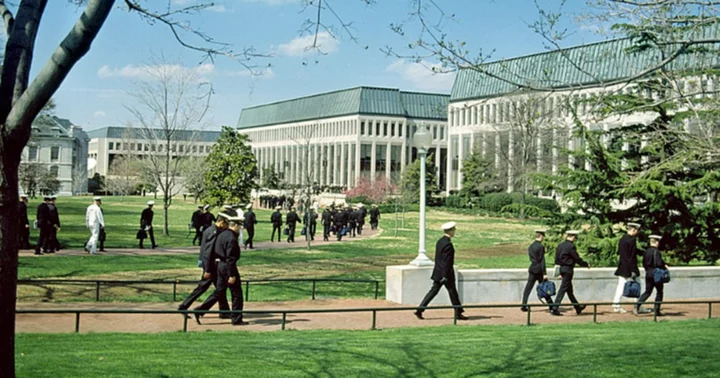ANNAPOLIS, MARYLAND: On October 10, 1845, the Naval School was founded in Annapolis, Maryland, in response to the discovery of a planned mutiny on the Atlantic Ocean aboard the US Navy brig USS Somers.
The institution was renamed the US Naval Academy in 1850.
Three seafarers, among them the 19-year-old offspring of Secretary of War John Canfield Spencer, were executed on the open waters, resulting from a mutiny.
Departing from New York in September 1842, the vessel embarked on a journey towards West Africa.
As reported by the US Naval Academy in its online history, "Discipline deteriorated on the Somers and it was determined by a court of inquiry aboard ship that Midshipman Philip Spencer and his two chief confederates, Boatswains Mate Samuel Cromwell and Seaman Elisha Small, were guilty of a 'determined attempt to commit a mutiny'."
Spencer "was conspiring with some twenty members of the crew to seize the [Somers], murder her officers and engage in piracy," according to the Naval History and Heritage Command, as per Fox News.
Moreover, Captain Alexander Slidell Mackenzie made the decision to carry out the executions of three sailors without convening a trial. Even after facing outrage over the situation, court-martial acquitted him in 1843, and went on to serve in the US Navy until 1848.
Who founded the US Naval Academy?
The institution was established as the Naval School on October 10, 1845, under the initiative of Secretary of the Navy George Bancroft.
Its purpose was to prepare interested candidates who were going to serve in the lowest commissioned ranks of the US Navy and Marine Corps, as per Britannica.
Notably, Bancroft, who was a historian and educator, wanted to improve the then-unsatisfactory methods used to instruct midshipmen.
In the beginning, the academy opened with seven professors and 50 midshipman students.
What is the academic curriculum of the US Naval Academy?
Originally named the Naval School, the curriculum at the time encompassed a range of subjects, including mathematics and navigation, gunnery and steam, chemistry, and natural philosophy. Candidates also needed to take English and French classes.
With the transition to the US Naval Academy, a new curriculum was implemented in 1850. Under this revised structure, midshipmen were required to study at the academy for a four-year period and participate in shipboard training each summer—an enduring format that still characterizes the academy's educational approach.
What makes the US Naval Academy special?
Since its establishment, the US Naval Academy has generated a notable roster of heroes of the high seas, pioneers in space exploration, and influential global leaders.
Distinguished among its graduates are Fleet Admiral Chester W Nimitz, who led the US Navy's Pacific command during World War II, overseeing the largest battle fleet in history; former President Jimmy Carter, who joined the academy amidst the peak of the war in 1943; and NASA astronaut Alan Shepard, the inaugural American and second person to journey into space.
The institution boasts a legacy that includes five leaders of the Joint Chiefs of Staff, nine Commandants of the Marine Corps, 54 astronauts, and an impressive count of 73 Medal of Honor recipients.









